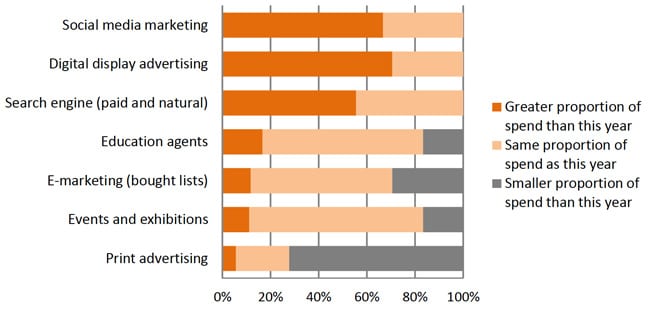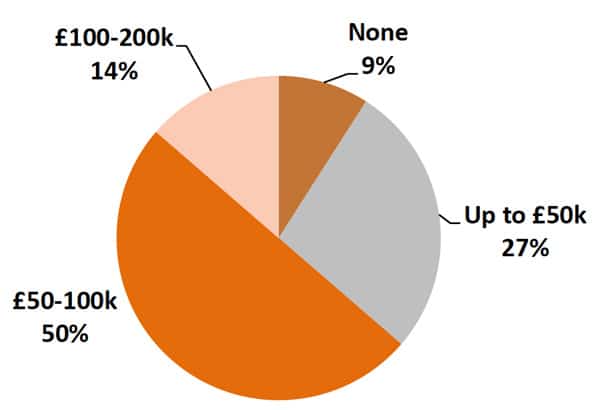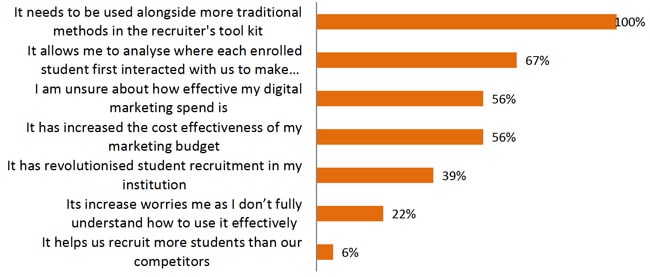Survey points to growing role for digital in international recruitment
It won’t come as a surprise that most international educators are giving greater weight to online marketing channels these days. Prospective students are heavy Internet users – and are highly engaged online - and so recruiters have naturally added a growing array of digital tools and platforms to their marketing efforts. A 2014 survey of 69 university and further education marketing teams in the UK pointed to a growing shift away from traditional channels – notably print advertising and directories – in favour of online marketing and open days or campus visits. The vast majority of respondents to The Guardian survey felt that online advertising (72% of respondents) and social media (98%) were more important than they were five years ago. The latest ICEF i-graduate Agent Barometer results provide another strong indicator of the growing role for digital in international recruitment. In this wide-ranging survey (1,671 agents; 110 countries), nearly two-thirds (63%) of respondents indicated that 20% or more of their leads came from online sources in 2015. And for nearly a third, online sources accounted for 40% or more of total leads. Another new survey - this time from UK-based student recruitment consultancy UniQuest - provides a more detailed view of how institutions are making the shift to digital marketing. It highlights the growing investment that universities and schools are making in online channels, and many of the common challenges they are encountering as well.
The new skill set
Speaking at the recent NARIC conference in London, UniQuest Managing Director Rachel Fletcher summarised the key challenges that recruiters have in working with digital channels. "Internal stakeholder engagement" figured prominently, both in terms of securing senior management support for increased spending on digital, and in ensuring effective processes across the institution for handling enquiries from online channels. Many of the other challenges highlighted by Ms Fletcher can be broadly categorised as “skills gaps” for international marketing teams. Marketers are especially struggling with how to track and analyse campaign results across the enrolment funnel. "Measuring the results of digital marketing activity starts with capturing information about every student who submits an enquiry and pulling in digital attribution data for each individual student, tracking it all the way through to enrolment," she says. The issue being that if you’re not capturing and studying this information carefully, you can’t report out properly on campaign results. More importantly, you are missing a chance to learn more about what worked – and what didn’t – and to apply those lessons to make your next online effort even more effective. “Look outside the sector at companies doing this well,” suggests Ms Fletcher. “What company did you last get an email from that really hit the mark for you with the right message, at the right time – probably a big retailer or travel company? Getting to a point where you can measure results and use this to optimise digital marketing spend while improving the student experience pre-enrolment is the prize for doing it all better.” Aside from measuring and analysing results, survey respondents also reported significant challenges in building digital expertise in-house, particularly across the range of platforms and channels used in international markets. They also reported difficulties with creating engaging and entertaining content, and in securing the buy-in of senior management for additional efforts or investment in this area.
Survey says: more digital
The UniQuest survey was conducted in June of this year and gathered responses from high-level international recruitment staff at 28 UK universities. The sample size is modest and constrained to the UK but the survey’s focus on international and the insights it offers on digital marketing practices provide important indicators for recruiters in many markets.
Nearly two-thirds (62.5%) of respondents indicated that their digital marketing budgets would increase in the coming fiscal year. Echoing the findings of The Guardian survey we noted earlier, the areas targeted for increased spending are social media marketing, online advertising, and search marketing (both paid and organic). Planned increases in these areas are being made at the expense of print advertising budgets, which 70% of respondents expected would fall as a proportion of total spending in the coming year.



















